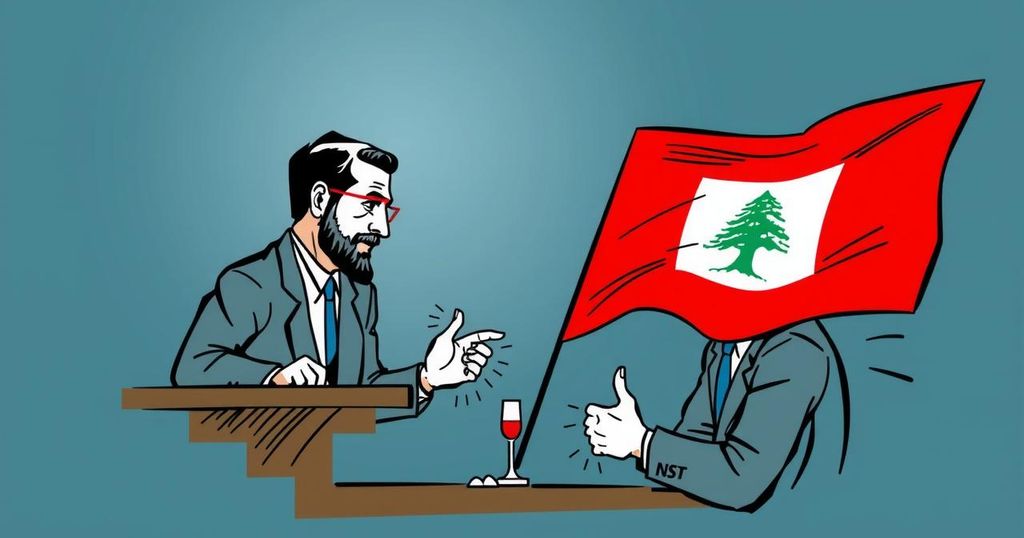Iran Affirms Support for Lebanese Ceasefire Amid Continued Israeli Strikes
Iran has pledged support for Lebanon’s ceasefire efforts with Israel, emphasizing solutions to ongoing problems exacerbated by Israeli attacks on Hezbollah. US-led diplomacy aims for a halt in hostilities. Key Lebanese figures, including Nabih Berri, are involved in negotiations, indicating potential for achieving a ceasefire amidst a significant humanitarian crisis affecting over a million displaced individuals in Lebanon.
Iran has expressed its unconditional support for Lebanon in its pursuit of a ceasefire with Israel, as articulated by a high-ranking Iranian official on Friday. This development underscores Tehran’s commitment to ending a conflict threatening its ally, Hezbollah, amid continuing Israeli airstrikes targeting Hezbollah-controlled regions in Beirut. These strikes constitute an ongoing military operation for the fourth consecutive day, resulting in considerable destruction, while diplomatic efforts for a ceasefire, largely driven by the United States, appear to be gaining momentum. Reports indicate that the US ambassador to Lebanon recently presented a ceasefire proposal to Parliament Speaker Nabih Berri, who has been endorsed by Hezbollah for such negotiations. Following this, Berri met with Iranian official Ali Larijani, who, when asked about potentially undermining the US-led efforts, affirmed, “We are not looking to sabotage anything. We are after a solution to the problems.” He further emphasized Iran’s commitment to supporting the Lebanese government, attributing disruptions to Israeli actions under Prime Minister Benjamin Netanyahu. Hezbollah, established by Iran’s Revolutionary Guards in 1982 and continuously armed and financed by Tehran, remains at the center of this conflict. A senior diplomatic source indicated that while achieving a ceasefire requires additional time, optimism remains that a resolution can be reached. The outgoing US administration is actively promoting a ceasefire in Lebanon in tandem with ongoing stalled efforts to address the Gaza situation. Global powers have stated that any ceasefire in Lebanon must adhere to UN Security Council Resolution 1701, which established the framework to end the previous conflict in 2006 between Hezbollah and Israel. This resolution mandates that Hezbollah relocate its personnel and weaponry north of the Litani River, approximately 20 kilometers from the border. Israel insists on retaining the right to respond to any violations of this agreement, a demand that Lebanon has rebuffed. During a meeting with Larijani, caretaker Prime Minister Najib Mikati reiterated Lebanon’s commitment to implementing Resolution 1701 and emphasized the importance of ceasing “Israeli aggression.” Larijani reaffirmed Iran’s backing for any decisions taken by the Lebanese government, particularly concerning the resolution. Since late September, Israel’s military operations against Hezbollah have intensified, coinciding with previous hostilities and the current Gaza conflict. Israel asserts that its military objectives aim to ensure the safety of its citizens, particularly those displaced from northern Israel due to cross-border attacks. The violence has resulted in a humanitarian crisis, displacing over one million Lebanese individuals. Prospects for a ceasefire appear to be improving, as Israeli officials have noted that conditions may now be the most favorable since fighting erupted. Reports suggest Prime Minister Netanyahu is eager to finalize a Lebanon ceasefire as a diplomatic achievement that could benefit the administration of US President-elect Donald Trump. According to Lebanese health authorities, Israeli actions have led to approximately 3,386 fatalities since October 7, 2023, with many occurring after late September. In comparison, Hezbollah’s assaults have resulted in around 100 casualties in Israel and neighboring territories over the past year.
The ongoing conflict between Israel and Hezbollah has escalated significantly since late September 2023, primarily driven by cross-border hostilities and militaristic engagements. This conflict has roots dating back to multiple previous confrontations, notably the 2006 war. As Hezbollah has been heavily reliant on Iran for military resources, the relationship greatly influences regional dynamics, particularly in Lebanon where the state apparatus is often intertwined with Hezbollah’s actions. The international community, particularly the US, has expressed urgency in navigating a ceasefire that adheres to established resolutions aimed at de-escalating tensions, highlighting the complexity of negotiations entangled in broader geopolitical considerations.
In summary, Iran’s backing of Lebanon in ceasefire negotiations reflects its strategic alliance with Hezbollah amid heightened conflict with Israel. Indicative of shifting dynamics, the latest diplomatic efforts, led by the US, suggest a cautious yet hopeful trajectory toward achieving a ceasefire. However, adherence to UN Resolution 1701 remains a critical point of contention, impacting both negotiations and regional stability. The humanitarian crisis resulting from the hostilities further emphasizes the urgent need for a resolution, reinforcing the intertwined fates of Lebanon and its Hezbollah affiliate amidst international scrutiny.
Original Source: indianexpress.com




Post Comment